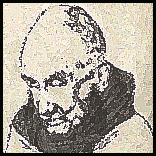Thomas Feverel Merton nejznámější citáty
Zdroj: Žádný člověk není ostrov, Krystal OP, Praha 1995, s.54
„Úsilí o svatost předpokládá ohleduplnost a velkodušnost v obyčejném životě.“
Zdroj: Josef Doubrava, Mozaika sebevýchovy, s.86
Thomas Feverel Merton: Citáty anglicky
“In our creation, God asked a question and in our truly living; God answers the question.”
Zdroj: New Seeds of Contemplation
Zdroj: Choosing to Love the World: On Contemplation, pp. 81-82
Statement from his final address, during a conference on East-West monastic dialogue, delivered just two hours before his death (10 December 1968), quoted in Religious Education, Vol. 73 (1978), p. 292, and in The Boundless Circle : Caring for Creatures and Creation (1996) by Michael W. Fox.
“Life is not a problem to be solved, but a mystery to be lived.”
Attributed to Merton in a number of sources, the earliest located being Studia mystica, Volumes 5-6 (1982), p. 76 http://books.google.com/books?id=59EYAAAAIAAJ&q=%22problem+to+be+solved%22#search_anchor. This does not attribute a direct quote to Merton, but says "To use another of Merton's favorite distinctions, for Furlong Merton's life is seen principally as a problem to be solved, which it was, in the final analysis, successfully, rather than a mystery to be lived". The next-earliest source located is the 1998 book The Artist's Way at Work: Riding the Dragon by Mark Bryan and Julia Cameron, which attributes the exact quote to Merton on p. 152 http://books.google.com/books?id=CghAQDPahhcC&lpg=PP1&pg=PA152#v=onepage&q&f=false. In reality this seems to be a slightly altered version of the quote "The mystery of life is not a problem to be solved; it is a reality to be experienced" which appeared in the 1928 book The Conquest of Illusion by Jacobus Johannes Leeuw, p. 9 http://books.google.com/books?id=OFdVAAAAMAAJ&q=%22not+a+problem+to+be+solved%22#search_anchor.
Misattributed
New Seeds of Contemplation (1972).
Zdroj: Choosing to Love the World: On Contemplation, p. 82
Thoughts in Solitude (1956)
"A Note To The Reader".
The Way of Chuang-Tzŭ (1965)
“The book of the Bible which most obviously resembles the Taoist classics is Ecclesiastes.”
But at the same time there is much in the teaching of the Gospels on simplicity, childlikeness, and humility, which responds to the deepest aspirations of the Chuang Tzu book and the Tao Teh Ching.
"A Note To The Reader".
The Way of Chuang-Tzŭ (1965)
'O God, we are one with You. You have made us one with You. You have taught us that if we are open to one another, You dwell in us. Help us to preserve this openness and to fight for it with all our hearts. Help us to realize that there can be no understanding where there is mutual rejection. O God, in accepting one another wholeheartedly, fully, completely, we accept You, and we thank You, and we adore You, and we love You with our whole being, because our being is Your being, our spirit is rooted in Your spirit. Fill us then with love, and let us be bound together with love as we go our diverse ways, united in this one spirit which makes You present in the world, and which makes You witness to the ultimate reality that is love. Love has overcome. Love is victorious. Amen.'
Closing statements and prayer from an informal address delivered in Calcutta, India (October 1968), from The Asian Journal of Thomas Merton (1975); quoted in Thomas Merton, Spiritual Master : The Essential Writings (1992), p. 237.
